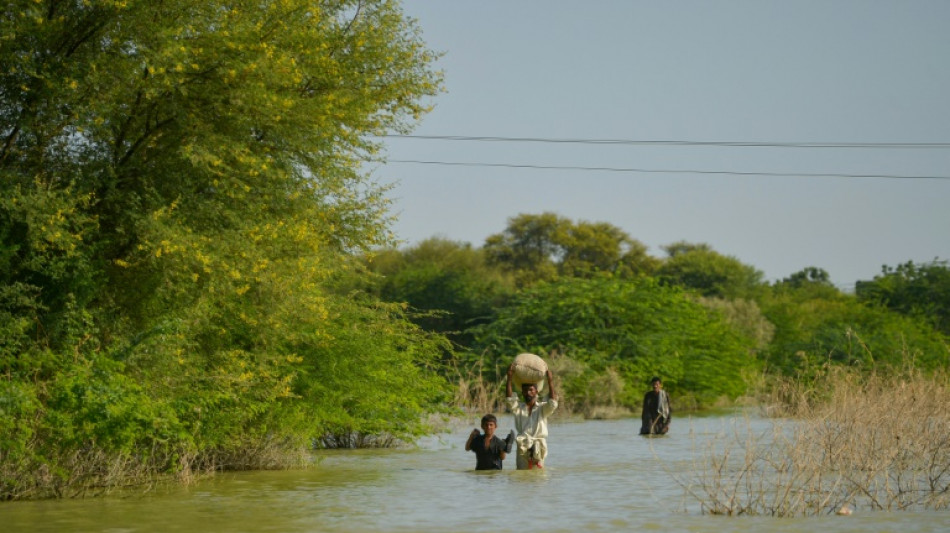
-
 Epstein survivors say abusers 'remain hidden' after latest files release
Epstein survivors say abusers 'remain hidden' after latest files release
-
'Full respect' for Djokovic but Nadal tips Alcaraz for Melbourne title

-
 Wollaston goes back-to-back in the Cadel Evans road race
Wollaston goes back-to-back in the Cadel Evans road race
-
Women in ties return as feminism faces pushback

-
 Ship ahoy! Prague's homeless find safe haven on river boat
Ship ahoy! Prague's homeless find safe haven on river boat
-
Britain's Starmer ends China trip aimed at reset despite Trump warning

-
 Carlos Alcaraz: rare tennis talent with shades of Federer
Carlos Alcaraz: rare tennis talent with shades of Federer
-
Novak Djokovic: divisive tennis great on brink of history

-
 History beckons for Djokovic and Alcaraz in Australian Open final
History beckons for Djokovic and Alcaraz in Australian Open final
-
Harrison, Skupski win Australian Open men's doubles title

-
 Epstein offered ex-prince Andrew meeting with Russian woman: files
Epstein offered ex-prince Andrew meeting with Russian woman: files
-
Jokic scores 31 to propel Nuggets over Clippers in injury return

-
 Montreal studio rises from dark basement office to 'Stranger Things'
Montreal studio rises from dark basement office to 'Stranger Things'
-
US government shuts down but quick resolution expected

-
 Mertens and Zhang win Australian Open women's doubles title
Mertens and Zhang win Australian Open women's doubles title
-
Venezuelan interim president announces mass amnesty push

-
 China factory activity loses steam in January
China factory activity loses steam in January
-
Melania Trump's atypical, divisive doc opens in theatres

-
 Bad Bunny set for historic one-two punch at Grammys, Super Bowl
Bad Bunny set for historic one-two punch at Grammys, Super Bowl
-
Five things to watch for on Grammys night Sunday

-
 Venezuelan interim president proposes mass amnesty law
Venezuelan interim president proposes mass amnesty law
-
Rose stretches lead at Torrey Pines as Koepka makes cut

-
 Online foes Trump, Petro set for White House face-to-face
Online foes Trump, Petro set for White House face-to-face
-
Seattle Seahawks deny plans for post-Super Bowl sale

-
 US Senate passes deal expected to shorten shutdown
US Senate passes deal expected to shorten shutdown
-
'Misrepresent reality': AI-altered shooting image surfaces in US Senate

-
 Thousands rally in Minneapolis as immigration anger boils
Thousands rally in Minneapolis as immigration anger boils
-
US judge blocks death penalty for alleged health CEO killer Mangione

-
 Lens win to reclaim top spot in Ligue 1 from PSG
Lens win to reclaim top spot in Ligue 1 from PSG
-
Gold, silver prices tumble as investors soothed by Trump Fed pick

-
 Ko, Woad share lead at LPGA season opener
Ko, Woad share lead at LPGA season opener
-
US Senate votes on funding deal - but shutdown still imminent

-
 US charges prominent journalist after Minneapolis protest coverage
US charges prominent journalist after Minneapolis protest coverage
-
Trump expects Iran to seek deal to avoid US strikes

-
 Guterres warns UN risks 'imminent financial collapse'
Guterres warns UN risks 'imminent financial collapse'
-
NASA delays Moon mission over frigid weather

-
 First competitors settle into Milan's Olympic village
First competitors settle into Milan's Olympic village
-
Fela Kuti: first African to get Grammys Lifetime Achievement Award

-
 'Schitt's Creek' star Catherine O'Hara dead at 71
'Schitt's Creek' star Catherine O'Hara dead at 71
-
Curran hat-trick seals 11 run DLS win for England over Sri Lanka

-
 Cubans queue for fuel as Trump issues energy ultimatum
Cubans queue for fuel as Trump issues energy ultimatum
-
France rescues over 6,000 UK-bound Channel migrants in 2025

-
 Surprise appointment Riera named Frankfurt coach
Surprise appointment Riera named Frankfurt coach
-
Maersk to take over Panama Canal port operations from HK firm

-
 US arrests prominent journalist after Minneapolis protest coverage
US arrests prominent journalist after Minneapolis protest coverage
-
Analysts say Kevin Warsh a safe choice for US Fed chair

-
 Trump predicts Iran will seek deal to avoid US strikes
Trump predicts Iran will seek deal to avoid US strikes
-
US oil giants say it's early days on potential Venezuela boom

-
 Fela Kuti to be first African to get Grammys Lifetime Achievement Award
Fela Kuti to be first African to get Grammys Lifetime Achievement Award
-
Trump says Iran wants deal, US 'armada' larger than in Venezuela raid


Malaria cases spike in Malawi, Pakistan after 'climate-driven' disasters
Extreme weather events in Malawi and Pakistan have driven "very sharp" rises in malaria infections and deaths, a global health chief said ahead of World Malaria Day on April 25.
Cases in Pakistan last year, after devastating floods left a third of the country under water, rose four-fold to 1.6 million, according to the World Health Organization (WHO).
In Malawi, Cyclone Freddy in March triggered six months' worth of rainfall in six days, causing cases there to spike too, Peter Sands, head of the Global Fund to fight AIDS, Tuberculosis and Malaria, told AFP in an interview.
"What we've seen in places like Pakistan and Malawi is real evidence of the impact that climate change is having on malaria," he said.
"So you have these extreme weather events, whether flooding in Pakistan, or the cyclone in Malawi, leaving lots of stagnant water around the place.
"And we saw a very sharp uptick in infections and deaths from malaria in both places," he said ahead of World Malaria Day on April 25.
Sands said World Malaria Day was usually an opportunity to "celebrate the progress we have made".
But this year it was an occasion to "sound the alarm".
The dramatic increase in cases caused by the climate-change-driven weather disasters illustrated the need to "get ahead of this" now, he said.
"If malaria is going to be made worse by climate change, we need to act now to push it back and where we can eliminate it," he said.
In both countries, pools of water left behind as waters receded created ideal breeding grounds for malaria-carrying mosquitoes.
- No 'silver bullet' -
Sands said there had been some progress made in the fight against malaria but stressed that a child still dies of the disease every minute.
In 2021, the WHO said there were an estimated 247 million cases worldwide and 619,000 deaths attributed to malaria.
Scientific breakthroughs saw more than a million children in Ghana, Kenya and Malawi last year given the RTS,S vaccine manufactured by British pharmaceutical giant GSK.
Another vaccine, R21/Matrix-M, developed by Britain's Oxford University, received clearance to be used in Ghana earlier this month -- the first time it has received regulatory clearance anywhere in the world.
But Sands, the fund's executive director, cautioned that the vaccines should not be seen as a "silver bullet".
Vaccines had less potential to combat the disease than routine diagnosis and treatment infrastructure due to the relative cost of immunisation and the difficulty of large-scale deployment.
The groups most vulnerable to malaria are children under the age of five and pregnant women, with deaths largely down to late diagnosis and treatment.
"It's all about having services that can diagnose and provide treatment... that means you need community health workers in every village, who actually have the tools to test and to treat," he said.
"And we need to ensure that these country's health systems are made more resilient to these kinds of shocks (because) what we tend to see is a lot of destruction of valuable medical commodities, drugs, treatments."
Sands said the countries at greatest risk from climate change were also those with the "highest burden of malaria".
"There's an almost perfect overlap so we are very concerned that the countries in which malaria is more prevalent... are also the countries that are most likely to get hit by the extreme weather events that climate change generates," he added.
D.Schneider--BTB



